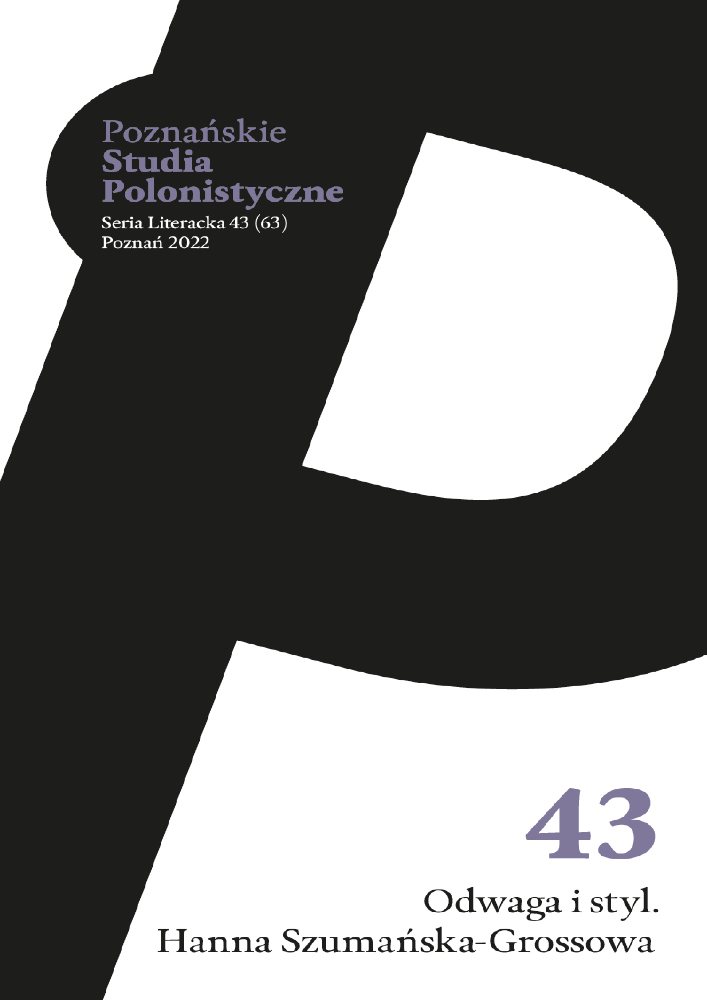Abstract
The article describes a series of Polish translations of Émile Zola’s 1886 novel L’OEuvre. The translations made by Aleksandra Callierowa (1886) and by Hanna Szumańska-Grossowa (1959) were created at completely different points in history, which significantly affects both the poetics of the translations and their reception. Callierowa’s translation was contemporary to the original, it conveyed the need to quickly keep up with the fashion prevailing in literature. Szumańska-Grossowa’s work, in turn, accentuates the fact that Zola already belonged to the canon of European literature and that he deserved – in accordance with the ideological assumptions of the then communist authorities – to be read bya mass reader.
References
Czekalski Eustachy (1959), Dzieła Zoli dla masowego odbiorcy, „Głos Pracy”, nr 191, s. 6.
Dziurzyński Dariusz (2001), „Brzuch Paryża” Emila Zoli i malarstwo martwej natury, „Przegląd Humanistyczny”, nr 1, s. 19–31.
Kaczmarek Anna (2009), Pióro, pędzel i klisza: tekst a obraz w powieściach E. Zoli, w: Kody kultury. Interakcja, transformacja, synergia, red. Halina Kubicka, Olga Taranek, Sutoris, Wrocław, s. 223–233.
Kulczycka-Saloni Janina (1986), Naturalizm jako zjawisko ponadnarodowe, „Pamiętnik Literacki”, nr 2, s. 87–99.
Kulczycka-Saloni Janina (2000), Na polskich i europejskich szlakach literackich. Z pism rozproszonych 1985–1998, wstęp, wybór i red. Danuta Knysz-Tomaszewska, Wydział Polonistyki Uniwersytetu Warszawskiego, Warszawa.
Lanoux Armand (1957), Dzień dobry mistrzu, przeł. Hanna Szumańska-Grossowa, wiersze przeł. Jerzy Zagórski, PIW, Warszawa.
Rogoziński Julian (1960), Antypowieść Wuja Zoli, „Przegląd Kulturalny”, nr 3, s. 47.
Suwała Halina (1968), Emil Zola, Wiedza Powszechna, Warszawa.
Szymanowska Joanna (2010), Refleksje na marginesie polskich przekładów „Trionfo della morte” Gabriela D’Annunzia, „Italica Wratislaviensia”, nr 1, s. 68–84, https://doi.org/10.15804/IW.2010.01.04.
Zola Emil (1886), Dzieło, przeł. Aleksandra Callier, Wydawnictwo „Przeglądu Tygodniowego”, Warszawa.
Zola Emil (1959), Dzieło, przeł. Hanna Szumańska-Grossowa, PIW, Warszawa.
Zola Emile (1982), Słuszna walka. Od Courbeta do impresjonistów. Antologia pism o sztuce, wybór i wstęp Gaëtan Picon, oprac. Jean-Paul Bouillon, przeł. i posł. Hanna Morawska, PIW, Warszawa.
Zola Émile (2022), L’oeuvre, La Bibliothèque électronique du Québec, Québec, https://beq.ebooksgratuits.com/vents/zola-14.pdf [dostęp: 3 października 2022].
License

This work is licensed under a Creative Commons Attribution-NoDerivatives 4.0 International License.
Authors
Authors of texts accepted for publication in „Poznańskie Studia Polonistyczne. Seria Literacka” are required to complete, sign and return to the editor's office the Agreement for granting a royalty-free license to works with a commitment to grant a CC sub-license.
Under the agreement, the authors of texts published in „Poznańskie Studia Polonistyczne. Seria Literacka” grant the Adam Mickiewicz University in Poznań a non-exclusive, royalty-free license and authorize the use of Attribution-NoDerivatives 4.0 International (CC BY-ND 4.0)Creative Commons sub-license.
The authors retain the right to continue the free disposal of the work.
Users
Interested Internet users are entitled to use works published in „Poznańskie Studia Polonistyczne. Seria Literacka” since 2016, for non-commercial purposes only, under the following conditions:
- attribution - obligation to provide, together with the distributed work, information about the authorship, title, source (link to the original work, DOI) and the license itself.
- no derivatives - the work must be preserved in its original form, without the author's consent it is not possible to distribute the modified work, such as translations, publications, etc.
Copyrights are reserved for all texts published before 2016.
Miscellaneous
Adam Mickiewicz University in Poznań retains the right to magazines as a whole (layout, graphic form, title, cover design, logo etc.).

